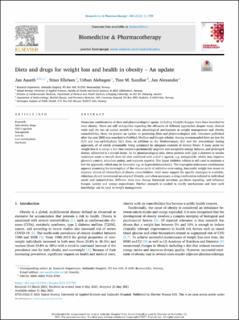| dc.description.abstract | Numerous combinations of diets and pharmacological agents, including lifestyle changes, have been launched to treat obesity. There are still ambiguities regarding the efficacies of different approaches despite many clinical trials and the use of animal models to study physiological mechanisms in weight management and obesity comorbidities, Here, we present an update on promising diets and pharmacological aids. Literature published after the year 2005 was searched in PubMed, Medline and Google scholar. Among recommended diets are low-fat (LF) and low-carbohydrate (LC) diets, in addition to the Mediterranean diet and the intermittent fasting approach, all of which presumably being optimized by adequate contents of dietary fibers. A basic point for weight loss is to adopt a diet that creates a permanently negative and acceptable energy balance, and prolonged dietary adherence is a crucial factor. As for pharmacological aids, obese patients with type 2 diabetes or insulin resistance seem to benefit from LC diet combined with a GLP-1 agonist, e.g. semaglutide, which may improve glycemic control, stimulate satiety, and suppress appetite. The lipase inhibitor orlistat is still used to maintain a low-fat approach, which may be favorable e.g. in hypercholesterolemia. The bupropion-naltrexone-combination appears promising for interruption of the vicious cycle of addictive over-eating. Successful weight loss seems to improve almost all biomarkers of obesity comorbidities. Until more support for specific strategies is available, clinicians should recommend an adapted lifestyle, and when necessary, a drug combination tailored to individual needs and comorbidities. Different diets may change hormonal secretion, gut-brain signaling, and influence hunger, satiety and energy expenditure. Further research is needed to clarify mechanisms and how such knowledge can be used in weight management. | |
